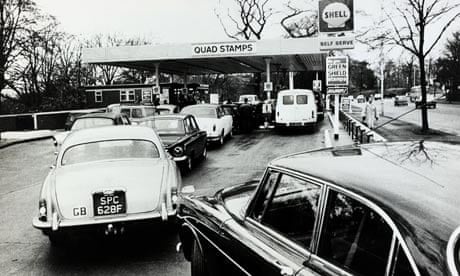What is a politician's main skill set: persuasion, self-advancement in a hostile environment, the ability to avoid blame? It might be many more things, some unmentionable, but it is not actually doing things. Generally, you wouldn't go to an MP to fix your plumbing, build a bridge, or bake and sell a pasty. In the main, they're not practical people.
For that reason perhaps we shouldn't be surprised to see them floundering recently in the face of real world events.
The extraordinary thing is that their instincts for survival and blame avoidance hadn't fully grasped the threat of the tanker drivers' protest (or indeed the nation's fond attachment to affordable hot pies). It is more than a decade since blockades of fuel depots by lorry drivers, upset at the price of petrol, brought the nation to within days of crisis. At the time everyone was shocked at how easily such a small number of people could leave us all at a standstill.
But it was a seizure waiting to happen. In nature, ecosystems require slack to function well. But narrow economic notions of efficiency and a culture of short-sighted cost cutting drove the practice of "just-in-time" delivery into the mainstream. As a result, instead of having back-up stores of food or fuel "just-in-case" – something which in nature and society for millennia has been a tactic for robustness and resilience – we hang by the thread of last-minute deliveries from elsewhere. A side-effect of the ready-made, just-in-time world has been to change our expectations, strip our skills to do with food, and foster dependency on the vulnerable logistics of the supermarket model.
That's why, with only around three days' worth of stores, at any one point in time we're only nine meals from anarchy, as we discovered in the summer of late 2000.
Rather than being efficient, over-reliance on just-in-time delivery makes essential systems incredibly fragile and vulnerable to interruption. Cue government minister Frances Maude delivering a seemingly off-the-cuff television interview about jerry cans worthy of Armando Ianucci's satire In the Thick of It.
But instead of Maude babbling advice that gave the Fire Service irregular heartbeats and brought quick rebuke, what else could have been done?
First of all, the inevitable long-term decline and rising price of oil is not a well-kept secret. At least since 2000 we should have been planning and implementing a new, energy efficient, mass transport system not reliant on oil.
Second, we need to plan a food system that is resilient to a range of "inevitable surprises", from climate, energy and politically driven shortages. With rising "food nationalism" as countries facing shortfalls understandably feed their own people first, as Russia has, the politics of the global food chain, is becoming a match for the geopolitics of oil.
The trend of the last few decades has been for the UK to become more dependent on the rest of the world, but this means becoming less so and more able to meet our own needs. Less energy intensive farming and transport systems will not only be more resilient, but they'll help tackle the core external shocks of climate change and dependence on volatile oil supplies.
Thirdly, we need to build in slack to the system and relearn how to do things for ourselves.
Is there a way to can tackle these problems at the same time as addressing broader economic and social problems?
I think so. National gardening leave, or something like it. Quite seriously, take a step back and look at a range of our problems.
Simultaneous overwork and unemployment, a whole range of social problems related to overconsumption and materialism, and a vulnerable deskilled population with a fostered dependency on the nanny supermarket. What single thing could begin to break such a negative spiral. Introduce a four-day week, with the fifth day given over to re-acquiring a wide range of practical skills that our politicians seemingly lack so desperately, which will allow us to stand on our own feet and do more for ourselves and our communities.
The benefits would be wide ranging. With more time to grow some of our own food, make, mend, do and repair, we'd get the buzz that comes from learning new skills, and the satisfaction of producing things, shifting away from the shopping mall deadness of purely passive consumerism. At the same time, the redistribution of both paid and unpaid work would bring more people back into the workplace, with all the wellbeing advantages that brings, while removing the destructive aspects of overwork. More time for friends, family, and getting involved with life and the community would improve things for everyone. Our own history shows that productivity is barely effected by shorter working weeks.
When Utah put its workforce onto a four-day week in 2008 in response to the recession, it saved millions, saw reduced absenteeism, healthier, happier workers and cut its carbon emissions by about 14%.
We could call them National Transition Days. So, instead of turning our garages or cupboards into petrol bombs, lets hear some good advice from government, the introduction of gardening leave for the nation (you wouldn't just have to grow food - walk, talk, fix a solar panel, take your choice). The working week has reduced beyond recognition in the last 200 years, lets just take it to the next logical step.

